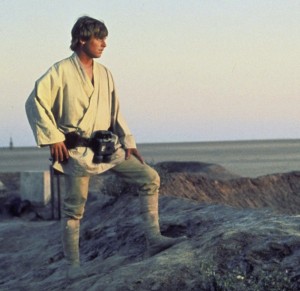Fallen Man, Son of Man
 Continuing our series on the Star Wars Saga (just arrived? Start here).
Continuing our series on the Star Wars Saga (just arrived? Start here).
In Episode 1: The Phantom Menace, Anakin appears innocent enough– not a bad bone in his body. We even discover that he is “divinely created”. Still, we know from subsequent movies that he will be tempted and fall from grace to embrace the dark side. Skywalker will serve the Emperor, his Lord and ruler,shackled to him like a dog. “I must obey my master”. The Emperor—perhaps better known to the discerning Christian as a representation of Sin Incarnate—takes Anakin under his wing. (Notice in The Phantom Menace, the first “Sith” apprentice we see is Darth Maul—who looks a lot like Satan, “sin’s” first apprentice.) Under “Sin’s” tutelage, Anakin, like the biblical Adam in the garden of Eden, becomes corrupt of mind, spirit, and body, literally masked by the face of death itself. By himself, Anakin is now helpless to reverse his condition. (All have sinned, and fallen short… if you will.) Little Anakin is now Darth Vader, his innocence lost. He has become much like you and I… trapped in bondage to a wrinkled, lecherous old master call the sin nature.
 Enter Luke Skywalker, the son of Anakin… the son of our fallen man… or perhaps the Son of Man? While I’m not trying to be blasphemous, Luke does emerge as a christological type of figure. As mentioned above, everyone thinks Luke is crazy and irrational in his hope to redeem Vader. Dad isn’t worth it, apparently… kind of like us, eh? As sinners by nature and choice, all men deserve to be punished for their atrocities. Anakin/Vader is irredeemable even by his own admission: “It is too late for me, son”. However, this “son” seeks out fallen man, just as Christ pursues the sinner. Even Darth is astonished when he realizes the son is seeking him; “He… will come to me?” When they meet, the son asks the fallen man to turn from his wicked ways; but the man is incapable of doing it on his own. “If only you knew the power of the dark side,” Vader tells Luke.
Enter Luke Skywalker, the son of Anakin… the son of our fallen man… or perhaps the Son of Man? While I’m not trying to be blasphemous, Luke does emerge as a christological type of figure. As mentioned above, everyone thinks Luke is crazy and irrational in his hope to redeem Vader. Dad isn’t worth it, apparently… kind of like us, eh? As sinners by nature and choice, all men deserve to be punished for their atrocities. Anakin/Vader is irredeemable even by his own admission: “It is too late for me, son”. However, this “son” seeks out fallen man, just as Christ pursues the sinner. Even Darth is astonished when he realizes the son is seeking him; “He… will come to me?” When they meet, the son asks the fallen man to turn from his wicked ways; but the man is incapable of doing it on his own. “If only you knew the power of the dark side,” Vader tells Luke.
As every Star Wars baby knows, Luke and Vader go to the throne room next, where the Son is tempted. Hmmm…. The Emperor (here playing the role of Satan archetype) explains that he will let the son rule, so long as Luke bends his knee to him. Sound familiar? As Satan tempted Jesus, the Sith Lord seeks to co-opt Skywalker. Naturally, the son rejects the temptation; the father (man), still serving evil, battles Luke, spitting in the face of the son’s freely offered love. As the struggle grows fierce, the Emperor haughtily assumes he is winning the war—after all, the boy is using “aggressive feelings”. Once again we confront the Jedi philosophy—that strong emotions are bad—but we find that the sinister Palpatine is wrong.
 Luke uses his hatred of evil (sin)—and his fury over the fallen man’s wickedness—to fuel his resolve. When Vader threatens Leia—their own family—the Son breaks Darth in body and Spirit, beating the sinful soul down and defenseless. The Son has employed these emotions properly—righteously—without going over the line. He stops just short of the abyss. Likewise many Christian converts, like Vader, reach a breaking point in their life that makes them recognize their pitiful condition. God breaks their spirit of stubborn, selfish pride. Tossing away the laser sword, Luke then offers mercy to the kneeling, defenseless Vader, demonstrating once more that temptation can be overcome.
Luke uses his hatred of evil (sin)—and his fury over the fallen man’s wickedness—to fuel his resolve. When Vader threatens Leia—their own family—the Son breaks Darth in body and Spirit, beating the sinful soul down and defenseless. The Son has employed these emotions properly—righteously—without going over the line. He stops just short of the abyss. Likewise many Christian converts, like Vader, reach a breaking point in their life that makes them recognize their pitiful condition. God breaks their spirit of stubborn, selfish pride. Tossing away the laser sword, Luke then offers mercy to the kneeling, defenseless Vader, demonstrating once more that temptation can be overcome.
 Unleashing his power on Luke, the Emperor pours out the agony of Sith/Sin upon the son. Refusing to fight, Luke chooses to sacrifice himself; he becomes a visual sermon, a final visceral appeal to the fallen man, Vader. Finally recognizing the depth of the son’s love, the fallen man cannot help but respond. (Now—to be fair—Christians do not “save” Jesus from crucifixion, so as Darth trades his life for Luke’s, a literal analogy falls short. Still, we see that fallen man’s redemption hinges on three contingent factors: the example, mercy, and suffering of the Son. These are the elements which, in Christ, crush and rebuild the heart of every Christian convert. And it is quite touching in the film to see the redeemed man’s devotion; Anakin is willing to lay down his life for His Savior. The Emperor’s evil energies kill Anakin’s body and make him a martyr, just as many believers have fallen for the cause of Christ.
Unleashing his power on Luke, the Emperor pours out the agony of Sith/Sin upon the son. Refusing to fight, Luke chooses to sacrifice himself; he becomes a visual sermon, a final visceral appeal to the fallen man, Vader. Finally recognizing the depth of the son’s love, the fallen man cannot help but respond. (Now—to be fair—Christians do not “save” Jesus from crucifixion, so as Darth trades his life for Luke’s, a literal analogy falls short. Still, we see that fallen man’s redemption hinges on three contingent factors: the example, mercy, and suffering of the Son. These are the elements which, in Christ, crush and rebuild the heart of every Christian convert. And it is quite touching in the film to see the redeemed man’s devotion; Anakin is willing to lay down his life for His Savior. The Emperor’s evil energies kill Anakin’s body and make him a martyr, just as many believers have fallen for the cause of Christ.
Redemption by the Son is perhaps Star Wars most powerful message, and will always be the climax… to the trilogy, or even if you accept the newer films. It is curious, however, to see new narrative truths emerging from the prequels.


[…] 6. The Skywalker Legacy […]
[…] away by these posts and it has helped me enjoy all six films all the more. Episode I Episode II Episode III Episode IV Episode V There is not greater series that I have read in the last ten years than […]
[…] of the different articles. It just might make Star Wars mean something more to you. Ep I, Ep II, Ep III, Ep IV, Ep […]